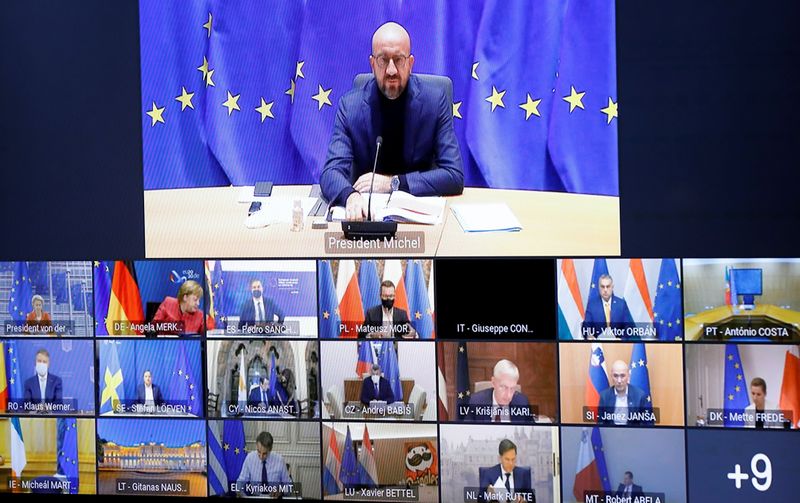BRUSSELS (Reuters) – The European Union’s executive wants Hungary to reform its public procurement laws to curb what it calls “systemic irregularities” before billions of euros from the EU pandemic recovery fund become available, according to an internal document seen by Reuters.
The European Commission is managing the 750-billion-euro stimulus scheme and has already told several EU states their proposals for spending their shares must be improved.
The bloc wants outright changes to Hungary’s public procurement laws, according to the Jan. 26 document, an internal memo prepared by Commission experts for talks with Hungary on recovery funds spending that laid out specific legal reforms required of Prime Minister Viktor Orban’s government.
“Competition in public procurement is insufficient in practice,” said the document, citing “systemic irregularities” that “led to the highest financial correction in the history of (EU) structural funds in 2019”.
Budapest, which has battled with EU authorities over rule of law issues in the past, said on Feb. 9 that there had been no such communication. “The government did not receive any kind of request from the European Commission, neither official nor informal,” Hungarian government spokesman, Zoltan Kovacs, said on Twitter.
The European Commission declined to comment on whether it had raised the matter with Hungary, and Reuters was unable to independently confirm whether the Commission communicated its position to Hungary since the Jan. 26 internal document.
Reuters originally reported on Feb.8 that the Commission had told Hungary it must reform public procurement laws to qualify for recovery funds.
Budapest is due to receive nearly 6.3 billion euros in free grants from the recovery scheme if its spending plan is proposed by an end-April deadline and then accepted by Brussels and other EU countries.
The Commission document called specifically for improved data transparency and accessibility, which it argued would lead to a fairer and more open procurement process.
Hungary had irregularities in nearly 4% of its spending of EU funds in 2015-2019, the bloc’s anti-fraud body OLAF said last year, compared to an EU average of 0.36% and much worse than the second-poorest score of 0.53% for Slovakia.
HUNGARY’S RECORD
OLAF said in 2016 that the EU should ask Budapest to repay more than 280 million euros in funding to build a metro line in the Hungarian capital due to “fraud and possible corruption”.
In 2018, Reuters investigated a tourism project https://www.reuters.com/investigates/special-report/hungary-orban-balaton around Lake Balaton, revealing plans to channel public funds – including EU subsidies – to Orban’s friends and family. Neither Orban nor the government responded to requests for comment at the time.
“It would be completely irresponsible of the Commission to allow these necessary funds to be managed by a system that lacks the necessary anti-fraud rules in place,” Transparency International’s Nicholas Aiossa said on Monday.
Orban has disputed OLAF’s findings, telling Reuters in September: “I don’t accept the point that Hungary is more corrupt than Austria or Germany or Denmark”.
The Commission document listed legal changes needed to introduce more transparency, real competition between bidders and accountability in Hungarian public procurement to avoid the need to recuperate misspent aid.
It said Hungary had one of the highest single-bidding rates in the EU, leading to systemic overpricing, and that Hungarian laws on conflict of interest were marred by loopholes.
“The Commission has been pushing for a better analysis and control of public procurement risks for many years,” the document read. “But there seems to be political opposition at the highest level. These measures are simple to implement from a technical perspective and fit into the digitalisation objectives.”
In his response to the Reuters report on the Commission document, Hungarian government spokesman Kovacs did not specifically address these points.
As France warned that back-and-forth between the Commission and EU countries risked delaying spending of the recovery funds, a senior Commission official said more work needed to be done to deliver more reforms.
“The overall balance between reforms and investments still needs to be fine-tuned,” the official said on Monday, adding countries needed to show how they would hit spending targets for climate projects and digital transition.
Many other countries are seeking EU funds to take their public administration, health and school systems online amid the pandemic, which has thrust the 27-country EU’s economy into a record recession.
(An earlier version of this story was corrected to say European Commission “wants” rather than “has told” Hungary to change procurement rules to avoid ‘systemic irregularities’)
(Reporting by Gabriela Baczynska; Editing by Mark John and Jon Boyle)

























